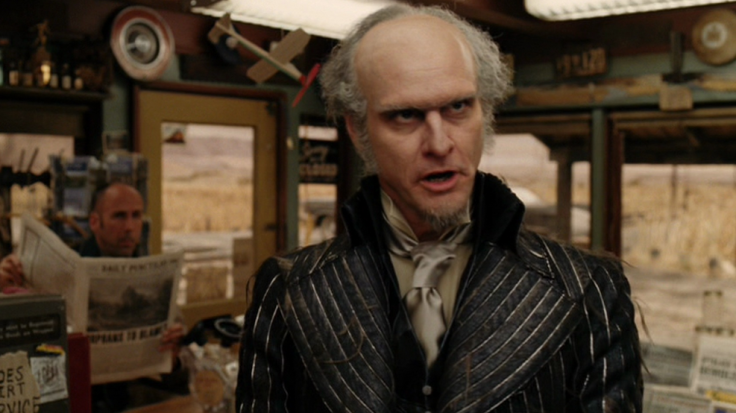'Lemony Snicket' Netflix Series: How New Adaptation Can Improve On The 2004 Jim Carrey 'Series Of Unfortunate Events' Movie

Fans of the “A Series of Unfortunate Events” novels by Daniel Handler (the author better known by his pen name Lemony Snicket) got some rather fortunate news Wednesday. Netflix announced that it would be re-adapting (Paramount released a film adaptation of the first three books in 2004) the novels in an original television series to stream on the site.
“A Series of Unfortunate Events” follows the lives of the three Baudelaire orphans (Violet, Klaus, and Sunny) as they move from foster home to foster home after their parents are killed when the family’s house suspiciously burns down. Along the way the children are pursued by their evil uncle, Count Olaf, who constantly schemes to get his hands on the Baudelaire family fortune. The book series was acclaimed for is sardonic wit and black humor, as well as its compelling portrait of children persevering in a cruel world.
The Netflix adaptation will be produced by Paramount Television, the TV wing of the studio that made the 2004 film. Author Daniel Handler will also come onboard as an executive producer overseeing the adaption of his novel series. There are 13 books in the “Series of Unfortunate Event” series, giving Netflix a lot of material to work with as it begins pre-production on the show.
The 2004 film adaptation, starring Jim Carrey as antagonist Count Olaf, received fairly positive reviews upon its release. However, many critics noted that the movie drastically toned down the dark and somber edge of the novels. While the film had some strengths and appeal as a family film, the spirit of the popular books was largely lost in the adaptation. Netflix, though, has the opportunity to right a few wrongs.
First and foremost, the streaming service will have to cast a more appropriate actor as the villainous Count Olaf. While Carrey’s physicality in the role and skill at impersonations (Count Olaf often assumes disguises to carry out his schemes) was impressive in a sense, the actor’s trademark persona contributed greatly to the movie falling short of the frighteningly gripping tone of the books. In the novels, Olaf is a hair-raisingly sinister character who is genuinely frightening on the page, willing to murder many and abuse the Baudelaire children in pursuit of the fortune. Carrey’s take on Olaf resulted in nothing more than a mischievous clown, entertainingly unlikeable, but not the gripping villain that made the books so captivating.
Lisa Schwarzbaum of Entertainment Weekly wrote in 2004, “Carrey sells Olaf's shticky side at the expense of inhabiting the character's more deeply chilling contours. Olaf is a threat to the children, one who just won't go away; Carrey's biggest threat is that he'll never stop clowning around.”
Carrey’s performance was indicative of a general softening of the books’ menacingly moving story with Claudia Puig of USA Today adding, “Though the movie is a literate adventure story, the series' dark tone is lightened up in the film just enough to make one yearn for the darkly twisted witticisms and pervasive anxiety that made Handler's books uniquely appealing.”
The Netflix series would be better served by doubling down on the strengths of the novels instead of trying to dumb them down for the masses. One of the bright spots of the movie was Jude Law’s portrayal of Lemony Snicket, used to represent the witty, fourth wall breaking asides to readers used by the author in the books. By maintaining the novel’s wicked wit and somber tone the series has a chance to be a much more unique tale (like the novels) than the film.
In fact, the mere fact that this adaptation will be a television series, as opposed to a film, gives Netflix more freedom to create a more loyal adaptation. While the movie attempted to jam the first three books of the long (13 book) series into one movie, the television show will have the opportunity to spend multiple episodes (and hours) on each book as it sees fit, allowing the anxiety and tension achieved in the books (as the orphans struggle to survive each of Olaf’s plots) to build up more organically on screen.
One cue, though, the Netflix series should take from the movie is the production design. If the film did not feel like “A Series of Unfortunate Events” (tonally), it sure looked like it. The houses and sets in the film perfectly captured the gothic, gloomy world described in Handling’s novels.
As with any adaptation of a popular novel series, Netflix will have many fans closely critiquing each decision. Luckily, the streaming service has a template to work off of and see where to improve.
Are you excited for the Lemony Snicket Netflix series? Tweet your thoughts to @Ja9GarofaloTV.
© Copyright IBTimes 2024. All rights reserved.












